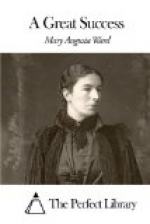And look after her he did. He was by no means an amusing companion. Lazy, gentle, and ineffective, Doris quickly perceived that he was entirely eclipsed by his wife, who, now that she was relieved of Mrs. Meadows, was soon surrounded by a congenial company—the Home Secretary, one or two other politicians, the old General, a literary Dean, Lord Staines, a great racing man, Arthur Meadows, and one or two more. The talk became almost entirely political—with a dash of literature. Doris saw at once that Lady Dunstable was the centre of it, and she was not long in guessing that it was for this kind of talk that people came to Crosby Ledgers. Lady Dunstable, it seemed, was capable of talking like a man with men, and like a man of affairs with the men of affairs. Her political knowledge was astonishing; so, evidently, was her background of family and tradition, interwoven throughout with English political history. English statesmen had not only dandled her, they had taught her, walked with her, written to her, and—no doubt—flirted with her. Doris, as she listened to her, disliked her heartily, and at the same time could not help being thrilled by so much knowledge, so much contact with history in the making, and by such a masterful way, in a woman, with the great ones of the earth. “What a worm she must think me!” thought Doris—“what a worm she does think me—and the likes of me!”
At the same time, the spectator must needs admit there was something else in Lady Dunstable’s talk than mere intelligence or mere mannishness. There was undoubtedly something of “the good fellow,” and, through all her hard hitting, a curious absence—in conversation—of the personal egotism she was quite ready to show in all the trifles of life. On the present occasion her main object clearly was to bring out Arthur Meadows—the new captive of her bow and spear; to find out what was in him; to see if he was worthy of her inner circle. Throwing all compliment aside, she attacked him hotly on certain statements—certain estimates—in his lectures. Her knowledge was personal; the knowledge of one whose father had sat in Dizzy’s latest Cabinet, while, through the endless cousinship of the English landed families, she was as much related to the Whig as to the Tory leaders of the past. She talked familiarly of “Uncle This” or “Cousin That,” who had been apparently the idols of her nursery before they had become the heroes of England; and Meadows had much ado to defend himself against her store of anecdote and reminiscence. “Unfair!” thought Doris, breathlessly watching the contest of wits. “Oh, if she weren’t a woman, Arthur could easily beat her!”
But she was a woman, and not at all unwilling, when hard pressed, to take advantage of that fact.




